






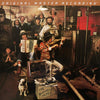
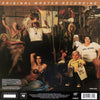

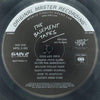
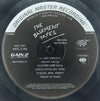
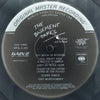
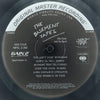
Bob Dylan & The Band – The Basement Tapes (2LP, Ultra Analog, Half-speed mastering)
Bob Dylan – acoustic guitar, piano, vocals [click here to see more vinyl featuring Bob Dylan]
The Band [click here to see more vinyl featuring The Band]
Rick Danko – bass guitar, mandolin, backing vocals
Levon Helm – drums, mandolin, bass guitar, vocals
Garth Hudson – Lowrey organ, clavinet, accordion, tenor saxophone, piano
Richard Manuel – piano, drums, harmonica, vocals
Robbie Robertson – electric guitar, acoustic guitar, drums, backing vocals [click here to see more vinyl featuring Robbie Robertson]
Written by Bob Dylan (A1, A3, A5, B1, B3-6, C1-2, C4, C6, D1-6), Richard Manuel (A2, A6, B6, C5), Robbie Robertson (A4, A6, B2, C5), Rick Danko (B2, D6). C3 is a traditional song.
2 LP, gatefold jacket
Limited numbered edition
Original analog Master tape : YES
Gain 2™ Ultra Analog
Half-speed Mastering
Heavy Press : 180g
Record color : black
Speed : 33 RPM
Size : 12'’
Stereo
Studio
Record Press : Record Technology Incorporated
Label : MOFI
Original Label : Columbia
Recorded June–September 1967 (Dylan & The Band) and 1967–1968 (The Band only) with overdubs in 1975
Recorded by Garth Hudson
Mixed by Ed Anderson, Mark Aglietti, Nat Jeffery, Rob Fraboni at The Village Recorder (Los Angeles) and Shangri-La Studio (Malibu, CA)
Produced by Bob Dylan, The Band
Remastered by Krieg Wunderlich and Rob LoVerde at Mobile Fidelity Sound Lab
Lacquer cut by Krieg Wunderlich
Originally released in June 1975
Reissued in May 2012
Tracks:
Side A:
- Odds and Ends
- Orange Juice Blues (Blues for Breakfast)
- Million Dollar Bash
- Yazoo Street Scandal
- Goin’ to Acapulco
- Kati’s Been Gone
Side B:
- Lo and Behold
- Bessie Smith
- Clothes Line Saga
- Apple Suckling Tree
- Please Mrs. Henry
- Tears of Rage
Side C:
- Too Much of Nothing
- Yea! Heavy and a Bottle of Bread
- Ain’t No More Cane
- Crash on the Levee (Down in the Flood)
- Ruben Remus
- Tiny Montgomery
Side D:
- You Ain’t Goin’ Nowhere
- Don’t Ya Tell Henry
- Nothing Was Delivered
- Open the Door, Homer
- Long Distance Operator
- This Wheel’s on Fire
Awards:
Rolling Stone 500 Greatest Albums of All Time - Ranked 335/500
Reviews :
“Youngsters will find it hard to believe there was a time when legendary music existed for most only in whispers but that’s how it was in the late 1960s. We saw what they wanted us to see and heard what they wanted us to hear.
There were bootleg LPs of course, and some of the recordings from these legendary sessions did make it out on boot vinyl but for most fans, Dylan and the Band’s “basement tapes” existed only in the form of whispers.
The “basement tapes” grew in stature both because they were unobtainable and because these were private recordings of Dylan and a group of musicians later to be known as The Band, made in the basement of their headquarters in a big pink house in West Saugerties, New York.
In other words, these were not glossy studio productions but rather what these musicians, particularly the by then god-like Bob Dylan recorded for their own pleasures. Everyone wanted to hear these pure gems but other than on miserable sounding, hard to find bootleg LPs, few managed. During this period following Dylan’s motorcycle accident and after Dylan had toured around the world with The Hawks, more than one hundred tunes were recorded in that basement and in studios in the Woodstock area.
Funny thing though: Manfred Mann recorded one of the songs from those 1967 sessions in 1968 and had a big Top 40 hit with “Mighty Quinn”. How he got the tune, which is not on this basement tapes album, remains unclear. Perhaps the South African, whose real name is Manfred Lubowitz, had some spiritual/religious connection to Mr. Zimmerman because in 1972 Mann produced the album Lo and Behold by Coulson, Dean, McGuiness, Flint (Sire SAS 7405) with all words and music by Bob Dylan.
That album contained the title track, which is on The Basement Tapes along with “Open the Door Homer,” and “Odds and Ends”— beating by four full years (back then a few musical lifetimes!) the official release of The Basement Tapes.
The release of this double LP (originally produced for record changers, with side one backed by side four), includes sixteen songs featuring Dylan and The Band along with eight songs by The Band, with overdubs added before the official release. So this is not really a “pure” recording of Dylan and The Band playing for themselves in that basement, but it’s still pretty damn close!
The Byrds recorded “You Ain’t Goin’ Nowhere,” “Nothing Was Delivered,” and of course The Band later recorded “Tears of Rage” and the masterpiece “This Wheel’s On Fire” but most of what’s here is not on that masterful level, though all of what remains does not disappoint the near mythical hold the unobtainable tapes had on Dylan’s fans back then and the original double LP (Columbia C2 33682) reached number 7 on the Billboard Top 200 charts—impressive for a “homemade” recording engineered by keyboardist Garth Hudson and sounding not at all like the ultra-slick recordings then popular and demanded by the record buying public, many of whom had also bought into reasonably high quality audio gear.
To get to the point: Mobile Fidelity’s remastering is close to miraculous, especially for anyone who grew up on the murky original. The Basement Tapes have long been out of print in any format, so to have them back on 180g vinyl cut from the original tapes and presented with pristine clarity for the first time (and sequenced as sides 1-2, 3-4) is great news for fans of Dylan and The Band.
Don’t expect polished studio sound of course, but also don’t expect the murky sound found on the original 1975 set. The clarity and transparency here will thrill fans of the original, though the mysterious fog of the lyrics and the dense, informal arrangements, remain thankfully intact.” Michael Fremer, Analog Planet, May 2012
“Dylan fans have waited a decade for an audiophile edition of The Basement Tapes, two discs of demos recorded in 1967 in the cellar of the Band’s upstate New York ranch house, but excluded from Columbia’s 2003 hybrid SACD reissues of Dylan’s catalogue. These relaxed, acoustic-oriented demo sessions, widely bootlegged but unreleased until 1975, were recorded on a Revox A-77 tape machine in a cinder-block cellar with a churning furnace, clanging pipes, and oil- stained concrete floor. The tracks evoke what Dylan biographer Greil Marcus has called “that weird old America” and are a window into one of the most productive collaborations in pop-music history. This 180-gram double LP—a forthcoming SACD wasn’t yet available at review time—is the first in Mobile Fidelity’s Dylan reissue series. It bodes well for audiophiles. MoFi’s remastering has scrubbed the sonic crud from the aggressive Redbook CD (on which the Band sounds like a garage band) and delivers a warm, nuanced, intimate performance (listen to the rich tones on the percussion). The result is stunning: it feels like you’re standing at the top of the basement stairs listening to Bob and the boys spin their magic. Justice at last for these culturally important tapes.” Greg Cahill, The Absolute Sound, October 2012
“Mobile Fidelity’s reissue features much richer timbres and dynamics than the original. But remember Dylan’s comment about being relaxed. While it’s still crackly in parts, occasionally sounding like it was produced on the Revox A77 tape recorder shown on the album cover, overall quality is very high, particularly given the stripped-down environment in which the record was captured essentially, Dylan’s basement, concrete walls and all. Where the original is consistently flat, lacking air and decay, the new pressing comes alive." - Jeff Dorgay, TONEAudio, May 2012
“The official release of The Basement Tapes -- which were first heard on a 1968 bootleg called The Great White Wonder -- plays with history somewhat, as Robbie Robertson overemphasizes the Band's status in the sessions, making them out to be equally active to Dylan, adding in demos not cut at the sessions and overdubbing their recordings to flesh them out. As many bootlegs (most notably the complete five-disc series) reveal, this isn't entirely true and the Band were nowhere near as active as Dylan, but that ultimately is a bit like nitpicking, since the music here (including the Band's) is astonishingly good. The party line on The Basement Tapes is that it is Americana, as Dylan and the Band pick up the weirdness inherent in old folk, country, and blues tunes, but it transcends mere historical arcana through its lively, humorous, full-bodied performances. Dylan never sounded as loose, nor was he ever as funny as he is here, and this positively revels in its weird, wild character. For all the apparent antecedents -- and the allusions are sly and obvious in equal measure -- this is truly Dylan's show, as he majestically evokes old myths and creates new ones, resulting in a crazy quilt of blues, humor, folk, tall tales, inside jokes, and rock. The Band pretty much pick up where Dylan left off, even singing a couple of his tunes, but they play it a little straight, on both their rockers and ballads. Not a bad thing at all, since this actually winds up providing context for the wild, mercurial brilliance of Dylan's work -- and, taken together, the results (especially in this judiciously compiled form with its expert song selection, even if there's a bit too much Band) rank among the greatest American music ever made.” AllMusic Review by Stephen Thomas Erlewine
Ultra Analog™ : The GAIN 2 Ultra Analog™ Series stems from the use of the Gain 2 system, mastered at half speed from the original master tapes where possible, capturing and uncovering as before undiscovered sonic information.
Half-speed mastering
In half-speed mastering, the whole mastering process is slowed down to half of the original speed. A typical 33 1/3 rpm record is cut at 16 2/3 rpm. The source material is also slowed down (reducing the pitch in the process) meaning the final record will still sound normal when played back. Slowing the whole process down allows more time, which means the end result sounds better and is more efficient — allowing engineering to minimize the effects of inherent limitations within the vinyl format. The result is a more accurate and more open high-frequency response in the half speed vinyl when compared with a normal speed recording.
Ratings :
AllMusic : 5 / 5 ; Discogs : 4.64 / 5 ; Michael Fremer : 9/10 Music, 7/10 Sonics

